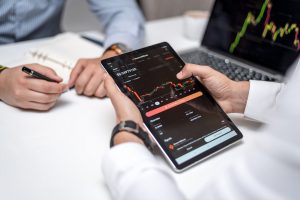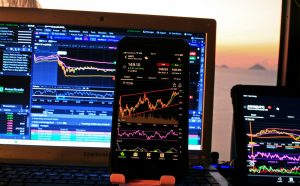
First thing in the morning
A day trader will check their phone to ensure that nothing has happened overnight in the cryptocurrency space.
Suppose they’re feeling particularly motivated or want to make some extra money.
In that case, they might try their hand at arbitrage (a process where individuals attempt to profit from the price difference of an identical product on two different exchanges).
If there is no market movement and the trader’s original investments are still intact, they go about making breakfast and catching up on the news related to blockchain technologies.
After eating and showering, it’s time for them to decide whether or not they should go out and socialise with friends.
Day traders usually avoid such things because maintaining relationships can be complicated.
When they spend most of their time reading Reddit posts and price action analysis, they may decide to call one of their friends and catch up.
Research, and more research
If they have decided against this, then it’s time for them to research all the coins they currently have invested in (or any new ones that might have been released).
By using web-based services such as Coinmarketcap.com, Livecoinwatch.com, Cheddur.com, and Reddit, a day trader will find out what is going on with each project or token they own an interest in.
Each site has a different way of sorting through cryptocurrencies to help make management easier when looking at percentages owned vs dollar amounts invested.
Afterwards, it is time to do more research on the market, analyse what is happening with different blockchain technologies, and chat about price action with other day traders or cryptocurrency enthusiasts.
As they finally start venturing out of the house, a day trader may find themselves making their way to Starbucks for an iced coffee or tea before logging back into email accounts related to investments that they might be interested in.
Once checking email, they see if any price alerts need immediate attention. If there aren’t, then it’s time to relax and maybe go out for lunch at one of their favourite spots near where they live.
At this point in the day, sometimes the best thing to do will be nothing at all (which can happen very often). If a day trader has already completed all of their work or doesn’t have anything important to do, they may take the time to enjoy themselves before investing.
Many people do this by going out and spending some money on trying new restaurants in their area, playing games, at a local internet cafe with friends, or even travelling to different cities.
Portfolio
After getting back from activities that one might like to partake in, it is time for them to go and recheck their portfolio.
Unless something drastic happened overnight and they missed it while socialising or taking part in something else during the day, they will most likely find that most coins they want to monitor are still doing the same thing.
If there is no significant change, they continue with their lives until it’s time for bed.
Day traders go about their daily lives differently than other people do.
By taking part in cryptocurrency markets and other financial tools that they might not have had access to before, day traders enjoy themselves immensely while trying to make money simultaneously.
Helpful tips for day traders
Be patient
Day trading requires lots of patience since things can take longer than expected or move against you quickly due to outside forces such as whales, market manipulation, and even natural disasters.
Diversify
Everyone should have an emergency fund that they can use in case something happens with their cryptocurrency portfolio.
Putting all of one’s eggs into one basket is never a good idea when it comes to finance
Small wins are great
Try not to get too greedy and always remember that it’s better to be happy with small gains than upset over much more significant losses.
Finally
Lastly, the three most important rules when day trading:
- Don’t invest more than you’re willing to lose.
- Never make decisions based on emotions.
- Trade what you know (not what you think).







